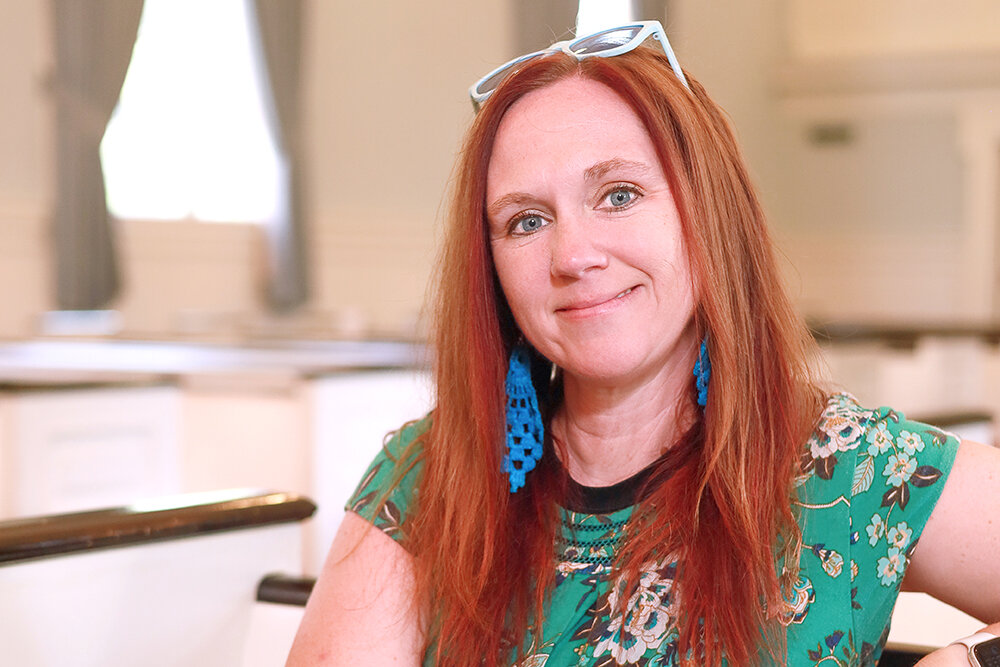YOUR BUSINESS AUTHORITY
Springfield, MO
YOUR BUSINESS AUTHORITY
Springfield, MO

The Have Faith Initiative brought together 100 faith groups and nonprofits during the pandemic to support the region during the health crisis. What’s the goal now?
It was crisis and urgency that brought us together and recognizing that communication was absolutely key. So, walking alongside the [Springfield-Greene County] Health Department and city and being able to ask questions. Out of that, there was relationship, on Zoom, but still meaningful connection that we recognized we’re better when we’re together. One of the things that happened as a way of celebrating – recognizing that space – was the Ozarks Festival of Faiths that took place this past January. To recognize we are different – and that’s great. Part of that vision was bringing folks around the table, building relationships and really figuring out how we can deepen that in places of understanding. We have a wide base of religious tradition here. We have resolved (to have) quarterly gatherings. Our spiritual lives and mental health and well-being was one (initiative) we named quickly. We’re already planning for our next Ozarks Festival of Faiths next year.
A study from the Pew Reseach Center finds religious discrimination is at a high among Muslims and is growing against Jews and Evangelical Christians. What are the opportunities to educate?
There’s a Buddhist community, the Ozarks Dharma Community, that practices here. We frequently partner with them. One of the ideas that my Buddhist sibling, Chris Williams, had in the wake of that is a walk and talk. It was a program that she had seen was happening in Canada to address the issue of polarization. It sounds overly simplistic, potentially, but brilliant. People get together and they go for a walk and there’s intentional questions and people are paired who are of different backgrounds to just get curious about each other. There’s research about this that when we walk together, that if we’re not having to have this face-to-face conversation, that it’s just this beautiful movement of what can transpire. The planners of the Ozarks Festival of Faiths did it together. Some folks sat. I ended up getting to walk with a sibling who is of Hindu tradition and another friend who, we’re both Christian but we have different understanding. It wasn’t about judging each other. It was about going for a walk together. We started with talking about our own faith background and our practices now and what we would want other people to know about our faith. It was incredible these moments of being able to share honestly. We can group people and make assumptions, but when I sit down with another human and I’m present to their story, something changes and transforms.
In the workplace, many religious holidays observed are from the Christian faith. But other holidays that might impact a person’s ability to work at times or participate in a group outing. How can workplaces be conscious of different religions?
Knowing who’s there in the space and finding ways to share those traditions. I feel like food is such an easy starting place if there’s a diversity of people and a willingness to try. I’m cautious to be prescriptive. It is more just an opportunity to get curious about each other and create more space where that feels possible and OK and, in fact, celebrated. And working toward acknowledging that we’re not always going to get that right. How do we speak up honestly and let ourselves evolve? All these things sound really nice, but the work of it is really tough.
National Avenue Christian Church was one of 200 organizations that opposed language in the state budget that prohibited funding of vendors and programs associated with DEI. That language was cut. What is the faith community’s role in DEI work?
Being curious, getting more education and a recognition that there is racism within our systems. Some of that means we’re going to have to change. How can we wade further into conversations about curiosity and getting to know one another better and acknowledging this is really important? I name and claim it from my practice as a Christian. I understand it as that’s a big part of the work that Jesus did as he was working alongside people who were marginalized. The work is first actively listening and figuring out what does that mean and then what are the impacts because they’re seismic in our community. I have been refreshed and energized, especially in the interfaith and Have Faith Initiative conversations, that even though we might be at different levels of understanding, we want to work toward this goal and we recognize that this is a part of the conversation and that racism has been alive and well in our community here in Springfield. We have to talk about that and know our history and figure out how to do better.
Tell me about your church’s position on DEI.
Everyone is welcome here and we have a list of genders, sexual orientation, ethnicity, religious background or not, all are welcome here. We’re really trying to live that out through a multitude of trainings. We made a move a couple years ago that our leadership of the church, we would ask them to go through anti-racism training. The next direction and move into the year ahead will be a revision of our bylaws and getting clear about how can that really be a value that weaves through every single practice from our hiring practice to our leadership.
Cedars Family Restaurant has cooked up comfort for over three decades.
Aquatic center fronting Sports Town in the works
Spring 2024 Construction in the Ozarks
SPD issues 36 citations to businesses for violating city’s gaming machine ban
Lost & Found Grief Center hires executive director
Nixa spokesperson takes job with city of Joplin